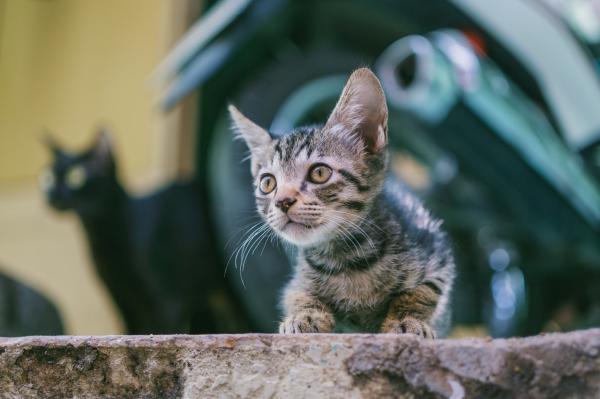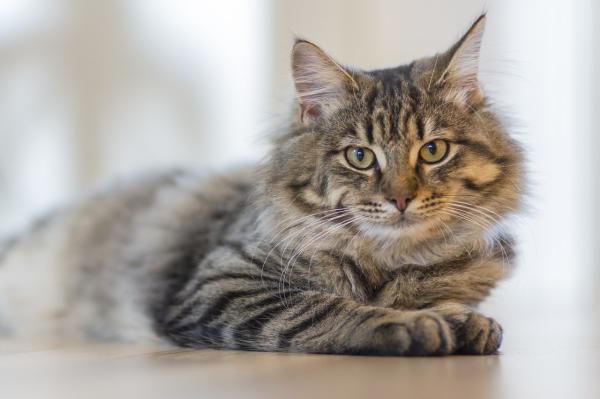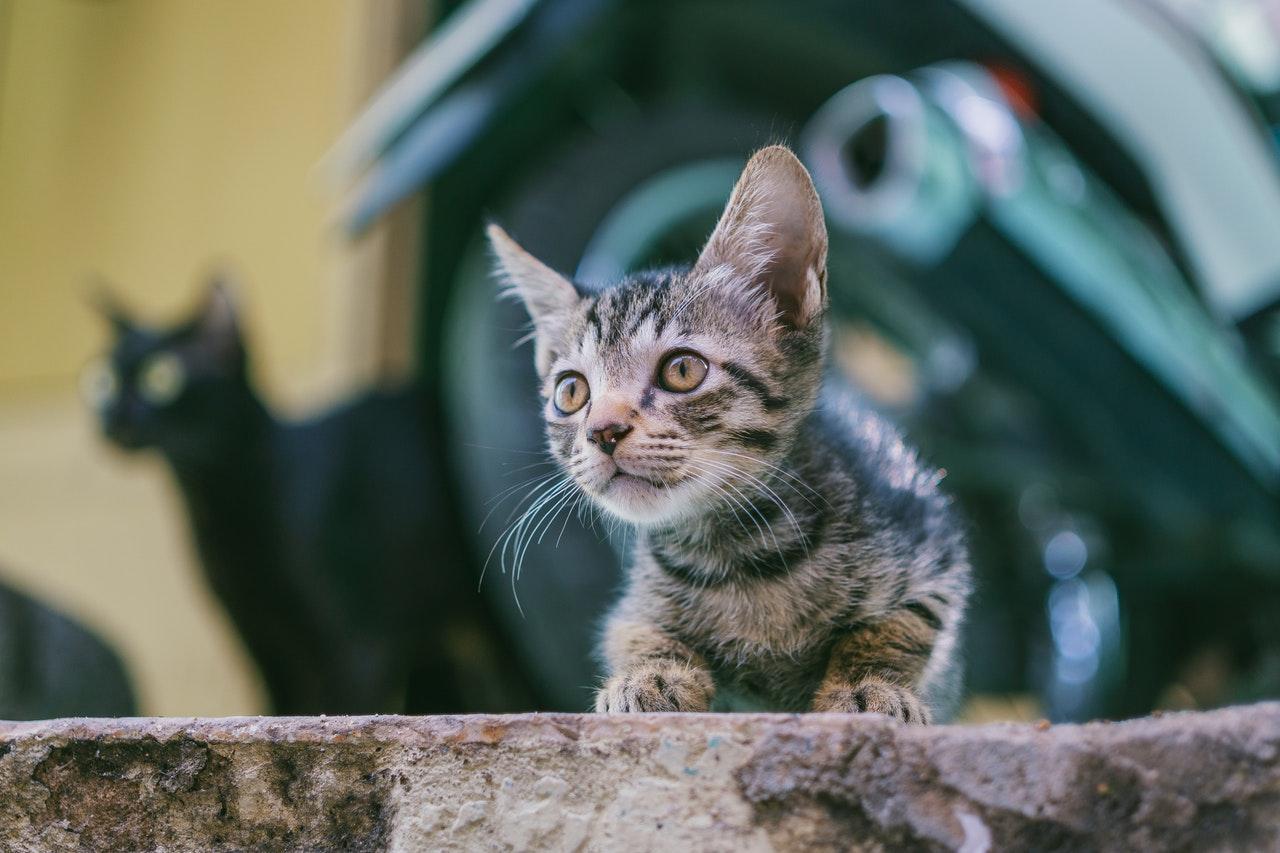Can I Give My Cat Human Lysine?


If your pet cat has stuffy nose and runny nose, it might indicate something more than a simple kitty cold. More than 50% of cats have feline herpes virus which may lead to a number of respiratory problems. Fortunately, lysine is there to help keep the outbreaks under check. Lysine is the amino acid your kitty really needs for optimum health, but its body is not able to produce it naturally. So, you can pick one at your local grocery store and supplement your cat’s diet with it. Although there are different brands and formulations for humans and cats, both are pretty much the same. Because pet grade lysine is quite expensive and difficult to find, you must be wondering can I give my cat human lysine? Here at oneHOWTO we have the necessary information you need about the use of human lysine for cats.
Info about feline herpes
Feline rhinovirus is also known as feline herpes or feline viral rhinopneumonitis. It is one of the most common conditions that cause respiratory problems in cats. Almost every cat is exposed to herpes virus. According to an estimate, around 90% of respiratory infections in cats are caused due to herpes virus or calicivirus. An annual vaccine is administered to protect cats from the herpes virus, but most cats already have this virus even before their vaccination starts.
Symptoms of a herpes infection in cats
If your cat has the herpes virus, it will get an outbreak especially when it is sick or stressed. Usually, a cat with herpes virus will show signs of eye discharge and a runny nose. You may also find it sneezing and getting congested. In serious outbreaks, your cat may lose appetite, develop fever and have eye ulcers. Mild cases may be managed with supportive care using lysine, but more serious conditions may need to be treated under the supervision of a qualified veterinarian.

How to use lysine for managing cat herpes
The herpes virus requires arginine amino acid for reproduction. Lysine is an amino acid which can be successfully used to trick it. The herpes virus may mistake lysine amino acid to be arginine amino acid and try to use it for reproduction. But it does not replicate as efficiently and it will fade away with time. Recommended dosage is 250-500 mg per day, but you may double the dosage if your cat is showing an outbreak. Always talk to your veterinarian before changing the dosage or giving lysine supplements to your kitty.
Without doubt, you can successfully use human lysine tablets for cats. For treating herpes virus, you may give one 500 mg tablet to your cat in a day. You may crush ½ a tablet and mix it in your cat’s food twice a day or you may crush one tablet and mix it in your cat’s food once a day. The veterinary version of lysine, including pastes and powders are flavored to make the administration easier. But you can’t give whole tablets to your cat. If you tried to, it would make the cat very uncomfortable and could provide a choking hazard. So, you can crush human lysine tablets and mix it in your pet’s food. They cat should easily ingest the lysine without realizing it is doing so.
Where is lysine available?
Lysine is available in different forms, including treats, paste, gel, pill and powder. The most common way of giving lysine to your cat is in powder form, as you can easily mix it in the cat’s food. Lysine treats are easy to use and usually tasty too. The dose comes already measured for your pet. In addition, human lysine is easily available in the health and wellness sections of most supermarkets.
If you don’t wish to visit a special vet store and pay some extra bucks for the same formula, you can go for human lysine instead. The human lysine version is generally the same as feline version, provided that the manufacturer has not added anything extra that may not be safe for cats. So, it is advised to check the lysine’s label before administering it on your feline friend.
One lysine form that you can find in grocery stores is cat treats with added lysine. Because lysine is extremely important for your cat's overall health and well-being, it is a common ingredient in many cat treats. Read the label carefully before treating your cat with lysine treats.
Where to find human lysine
Most grocery stores have a health and wellness section, where you can easily find lysine capsules. But they are not prepared for pets, such as flavored chews and paste. If you are looking for flavored lysine supplements, then you may need to do some extra shopping around. Many small stores do not have these sections, so you would need to visit a larger supermarket that have a separate section for health supplements and vitamins. While selecting human lysine for your cat, avoid any products which contain propylene glycol. This is a frequently used ingredient in many pharmaceutical products, but it can lead to anemia in your kitty.

Benefits of Lysine for Cat
Lysine improves your cat's health by supporting its metabolism, regulating its hormone production, aiding their digestion and promoting normal functioning of its organs. It also helps the cat to produce healthy collagen, skin cells and fur. If your cat is ill with a feline herpes infection, then lysine will be efficiently helpful in its treatment. Not only will it treat feline herpes, but will also manage viral rhinotracheitis, conjunctivitis and other such problems.
Consult Your Veterinarian
Whether you are giving human lysine to your cat as a supplement or for treating herpes infection or any other medical condition, it is always best to talk to your vet first. They will tell you whether human lysine is appropriate for your cat and recommend the dosage you should give to your feline friend. Even if you decide to give human lysine to your cat, it is advised not to give to your cat anything without the recommendation from your veterinarian.
Although giving human lysine to your cat is considered to be safe, your veterinarian will be the perfect person to give you the guidelines. If your cat has a medical history, then the veterinarian will be able to decide whether human lysine is safe for your cat or if it needs a particular amount.
Conclusion
Human lysine is available in powder, liquid and gel form which is considered to be administered to humans as well as to cats. If you give lysine to your cats in random spurts, it should remain safe from eye problems, UTI issues, herpes infections, respiratory diseases and many other related conditions. That being said, lysine is already included in many cat food formulations. One good thing about giving lysine to your cat is that is practically impossible to give it an overdose.
The cat’s body does not produce it naturally, so giving too much of lysine to your cat is not going to hurt it. A healthy adult cat can efficiently receive as much as 1000 mg per day. The packet that you buy should bring a dosing method with it, such as a scoop or measuring spoon, along with a denotation of measurement. Again, double check to ensure there are no other ingredients added to the lysine supplement which may be unhealthy for your cat.
If you want to read similar articles to Can I Give My Cat Human Lysine?, we recommend you visit our Pets category.






